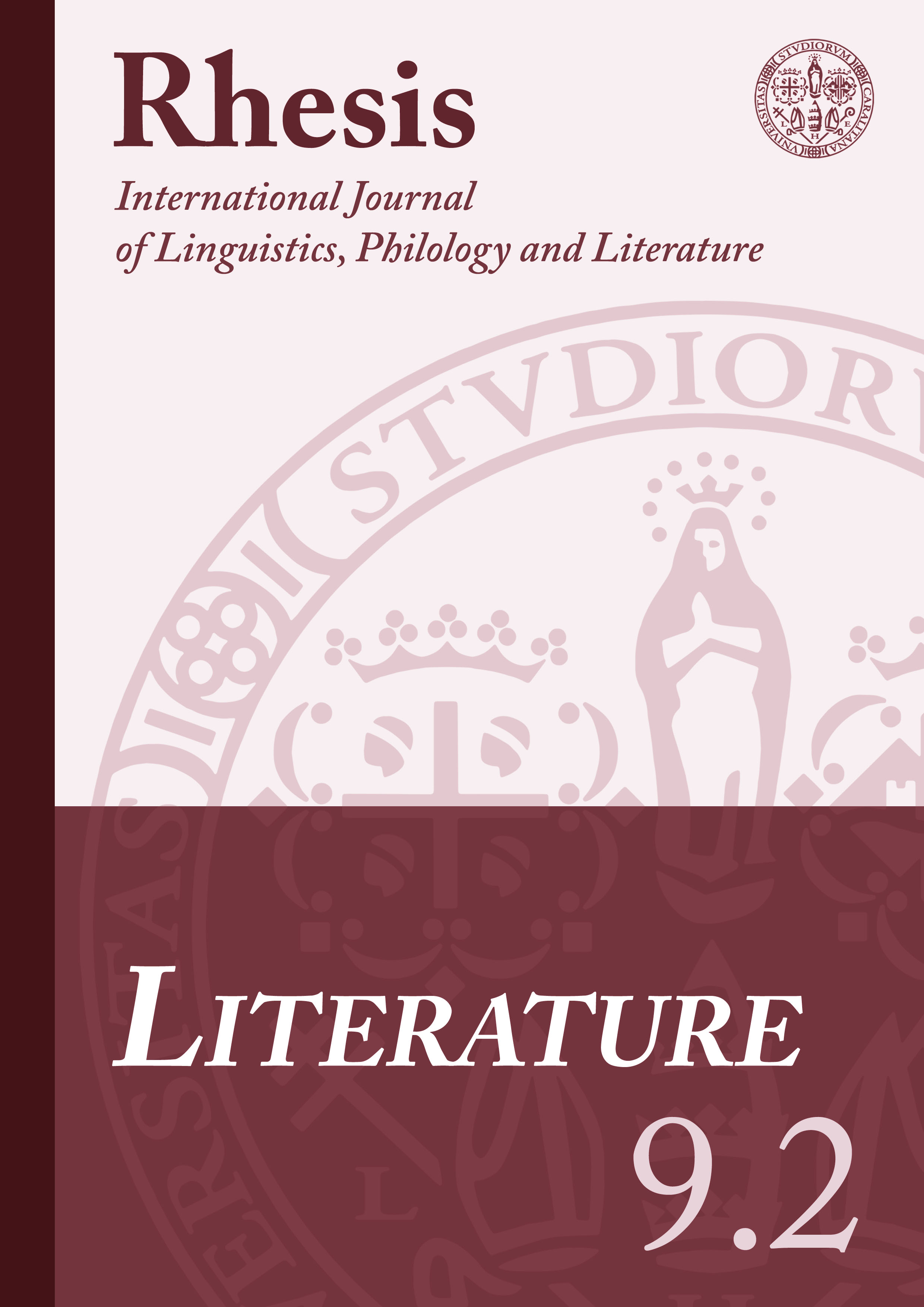The Sister’s Gaze in Ian McEwan’s Atonement
Abstract
Atonement by Ian McEwan (2001) is a novel structured around some key episodes that gradually shift the reader’s attention to the more self-reflective elements of the text. The centrality of the gaze, the voyeuristic attitude of the characters, and the multiple perspectives force the reader to return to scenes already “seen”, recalling, in the end, the reader’s own gaze from outside the text. The last pages, in particular, because of their manipulation of the events, make the reader the final witness.
Starting from Lacan’s theory on the gaze, this article analyses how the traumatic scene observed by the younger sister, unbeknownst to the elder, serves as a mythopoetic device and it is at the origin of the mise en abîme on which the Chinese box structure of the novel stands. The repetitions of the trauma – first with the furtive reading of an obscene letter addressed to the older sister and then with the love scene in the library – mark the gradual prevailing of the imaginary on the real, until the final discovery of the fictionality of the whole story.
Downloads
References
BOTTIROLI, Giovanni, “Strutturalismo e strategia in Jacques Lacan. Un’interpretazione della Lettera rubata”, «Aut Aut», 177 (1980), pp. 95-116.
BROOKS, Peter, Reading for the Plot. Design and Intention in Narrative, Cambridge MA, Harvard University Press, 1992 [1984].
BROWN, Sara Annes, Devoted Sisters. Representations of the Sister Relationship in Nineteenth-Century British and American Literature, Aldershot, Ashgate, 2003.
DÄLLENBACH, Lucien, Il racconto speculare: saggio sulla mise en abyme, translated by Bianca Concolino Mancini, Parma, Pratiche, 1994.
FERRARI, Roberta, Ian McEwan, Firenze, Le Lettere, 2012.
FINNEY, Brian, “Briony’s Stand against Oblivion: The Making of Fiction in Ian McEwan’s ‘Atonement’”, «Journal of Modern Literature», 27.3 (2004), pp. 68-82.
FREUD, Sigmund, The Wolfman and Other Cases, translated by Louise Adey Huish, New York, Penguin, 2003.
FREUD, Sigmund, Il perturbante, translated by Cesare L. Musatti, Roma, Theoria, 1984.
FREUD, Sigmund, Al di là del principio di piacere, translated by Anna Maria Marietti, Torino, Bollati Boringhieri, 1975.
HEAD, Dominic, Ian McEwan, Manchester-New York, Manchester University Press, 2007.
HIDALGO, Pilar, “Memory and Storytelling in Ian McEwan’s Atonement”, «Critique», 46.2 (2005), pp. 82-91.
KELLMAN, Steven G., The Self-Begetting Novel, New York, Columbia University Press, 1980.
KRIPS, Henry, “The Politics of the Gaze: Foucault, Lacan and Žižek”, «Culture Unbound. Journal of Current Cultural Research», 2 (2010), pp. 91-102.
LACAN, Jacques, The Seminar of Jacques Lacan, Book XI. The Four Fundamental Concepts of Psycho-Analysis (1977), translated by Alan Sheridan, New York London, W. W. Norton and Company, 1998.
LACAN, Jacques, “Seminar on The Purloined Letter”, in ID, Écrits. The First Complete Edition in English, translated by Bruce Fink, in collaboration with Héloïse Fink and Russel Grigg, New York-London, W. W. Norton and Company, 2006, pp. 6- 48.
LACAN, Jacques, Anxiety. The Seminar of Jacques Lacan. Book X, ed. Jacques-Alain MILLER, translated by Adrian R. Price, Cambridge, Polity Press, 2014.
MARCUS, Laura, “Ian McEwan’s Modernist Time: Atonement and Saturday”, in GROES, Sebastian (ed.), Ian McEwan. Contemporary Critical Perspectives, London-New York, Bloomsbury, 2013 [2011], pp 83-98.
MATTHEWS, Peter, “The Impression of a Deeper Darkness: Ian McEwan’s Atonement”, «ESC», 32.1 (2006), pp. 147-160.
MCEWAN, Ian, Atonement, London, Vintage, 2002 [2001].
MULLER, John P., RICHARDSON, William J., “Lacan’s Seminar on ‘The Purloined Letter’: Overview”, in MULLER, John P., RICHARDSON, William J. (eds.), The Purloined Poe: Lacan, Derrida and Psychoanalytic Reading, Baltimore-London, Johns Hopkins University Press, 1988, pp. 55-76.
PYRHÖNEN, Heta, “Purloined Letters in Ian McEwan’s Atonement”, «Mosaic», 45.4 (2012), pp. 103-118.
SUMMERS-BREMNER, Eluned, Ian McEwan. Sex, Death, and History, Amherst, Cambria, 2014.
ŽIŽEK, Slavoj, The Plague of Fantasies (1997), London-New York, Verso, 2009.



